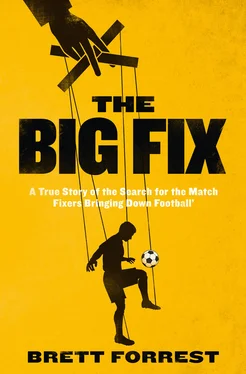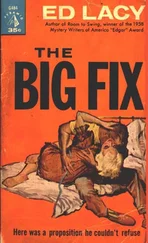The bookies at 188Bet had not determined that an outcome of three or more goals was now more likely. What they had done was moved the odds in reaction to the overwhelming wagers they were receiving on three or more goals. It is the bookmaker’s goal to level his book, taking equivalent action on either side of a proposition in order to reduce his exposure and profit from his margin. And a bookie knows that his exposure is highest when he is taking a large amount of action on an illogical proposition. He knows that the match is fixed, as the bookies at 188Bet are likely to have understood as they re-calculated in-game odds for the Sharjah match following the bets placed.
As the game neared halftime, only one goal had been scored. In the thirty-eighth minute, the referee called another penalty. This one appeared legitimate, as a Kuwaiti defender tackled a Jordanian forward in the box. The goalkeeper for Kuwait saved the ensuing kick. However, the linesman flagged him for early movement. Jordan scored on the retake. At the half, the match was tied at one all. With forty-five minutes to play, all the syndicate needed to win its bets was one more goal. Easy. But then something happened.
In the grandstand, the FIFA investigators contemplated attempting to bluff their way into the locker rooms to confront the referee and players. As they did so, they watched the man from the Emirati promotional company climb the stairs of the VIP stands. He spoke with the Singaporean fixers. As FIFA suspected, the match referee had received a tip that the match was under observation. The players returned to the field for the second half, and the Singaporeans left the stadium. Midway through the second half, the score was still 1–1.
Suddenly, in the seventy-first minute, the betting action reversed. There was no longer heavy action at 188Bet for more than three goals, although there were nineteen minutes remaining in which to score for the third time. Warned that FIFA investigators were present in the stadium, the syndicate had pulled the fix, pulled its bets. The match finished in a 1–1 draw.
From the chatter that FIFA’s security team subsequently collected in Singapore, syndicate members were confused, wondering who had leaked word of the Sharjah operation. The syndicate had lost roughly $500,000 on the Sharjah match, according to FIFA intelligence. Considering the size of the football betting market, this wasn’t a considerable number. However, the event in Sharjah was significant. No one had ever fought the syndicate before. Sure, there had been traditional prosecutions, investigations conducted after the crime had been committed and the profits earned. But never before had FIFA conducted a counter-fixing operation in real time. Asian fixers and their European partners had operated freely for a decade. Everything was about to change.
SINGAPORE, 1983
The best football players are poor. Wilson Raj Perumal came to this understanding decades ago, sitting in the grandstand of Singapore’s Jalan Besar Stadium. It was the mid-1980s, and the old grounds, near the city-state’s Little India neighborhood, were hosting a domestic league match. Perumal had no rooting interest. For him, it would always be about the odds, the line, the payout.
During the World War II occupation of Singapore, Japanese authorities set up camp at Jalan Besar, where they culled the Chinese from the population, marking them for summary execution. Now, to Perumal, it was the Chinese who stood out most of all. Sipping tea, betting on matches (contrary to local statutes), they orchestrated the action that worked Perumal’s mind toward opportunity.
Perumal had plenty of friends who played organized football. He understood the game. What he didn’t understand was how these old men had been taking his money for the past half year. Perumal had started betting for fun. It was something to do with his friends from school. He didn’t comprehend what was known as hang cheng betting, which was determined not by which team won the game, but by an agreed-upon value of one’s bet. The line dictated the score by which one team had to win, and the odds corresponded to the likelihood of that event coming to pass, establishing the amount of a winning bet. Once he learned this, Perumal easily recognized the pattern of his losses. Each time Perumal placed a bet, the Chinese men changed the odds and the line to suit themselves. They had been manipulating the market depending on which team Perumal chose, which bet he wanted to place. They had been rigging the action all along. Determined on winning back the money he had lost, and more besides, Perumal got an idea.
Theft was the first charge the cops hung on Perumal, for stealing a pair of football cleats. This was in 1983. Eighteen years old, Perumal lived with his family in Choa Chu Kang, a farming area in Singapore’s northwest. His parents traced their roots to Chennai, the capital city of India’s heavily populated Tamil Nadu state, a wellspring of cheap labor to Asia and the Middle East. They were part of a long line of convicts and unskilled workers who had made their way from India to Singapore during the century leading up to World War II, when the two territories existed under British colonial governance. Perumal’s father, a simple laborer who painted street curbs and laid cable, was a black belt in judo. Perumal never took to such discipline. Instead, the lasting impression that his father gave him was how difficult it was to feed five children on honest industry. “Some days we had to make it on one meal,” Perumal says. He was the middle child, the one who gets lost in the shuffle, the one who finds other ways to survive. He attended Teck Whye, the local school where he ran the 800 meters and paid passing attention to his studies, more interested in the dubious extracurricular activities that awaited him after school.
Perumal and the Singaporean state were born the same year, 1965, though their characters instantly diverged. Upon exiting the British realm, Singapore’s leaders placed the country on a path of economic vigor. Shipping, manufacturing, and industrialization transformed Singapore into one of the four Asian Tigers, a center of international business and finance. Underlying this growth was Singapore’s commitment to discipline, its blunt approach to crime. Unlike many of its neighbors, stricken with the chaos of liberalism or the stagnation of autocracy, the Singaporean city-state struck a balance: tough on crime, friendly to business. Singapore became a place where the sinner was punished disproportionately to his sin, so that the innocent could prosper likewise beyond proportion.
Wilson Perumal belonged to the third-largest ethnic group in Singapore. There was no such thing as a Singaporean. There was Chinese, Malay, Sinhalese, Filipino, Thai, each with a different language, each adopting English as default dialect, each keeping secrets in their particular tongues. Singapore was a place of secondary identities, a place of no insiders. Perumal skimmed from one social set to another, between ethnic groups, learning to conceal his motivation in order to persuade and gain advantage. He could have made an effective salesman if he hadn’t gravitated to kids who likewise couldn’t conceive of their futures, just what they could get their hands on right now. Perumal tried his hand at petty crime. With a few friends, he stole a VCR from the Teck Whye School. They sold it, pulling in five hundred Singapore dollars. They took a cab downtown, saw a few movies, blew the money on popcorn and beer, incautious about what they had done.
Later, a member of his crew stole a pair of football cleats, and this led to the group’s undoing. Confronted by the authorities, the friend told the whole story, about the shoes, the VCR, and other thefts, implicating Perumal in so doing. The next day, a headline in the local paper read: “Asian School Athlete Charged with House Breaking.” It was the sort of teenage troublemaking that often scares an adolescent onto the right path in life. In Perumal, the episode simply provided his first publicity. There would be much more.
Читать дальше











